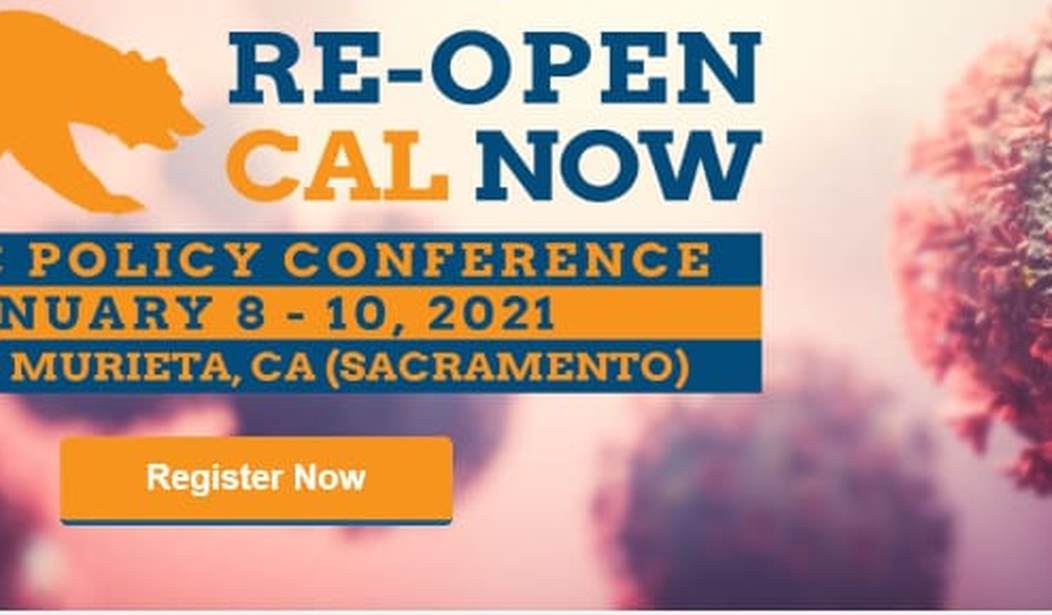Last weekend’s Re-Open Cal Now Public Policy Conference was met with much derision and opposition. But as satirist and essayist Jonathan Swift said,
“When a true genius appears, you can know him by this sign: that all the dunces are in a confederacy against him.”
Those dunces belonged to the Sacramento Bee editorial board, who, the day the conference was scheduled to begin, took to their pages to write a screed that was reminiscent of being on the rag.
I used to be on the rag, so I would know.
Instead of reporting the facts and focus on the conference’s goals of weighing the consequences of lockdown vs. the benefit of re-opening California and how that could be done safely, the Bee rendered judgment on the political leanings of the organizers and dismissed and denigrated any knowledge that veered from the status quo of bureaucratic orthodoxy:
“With over 28,000 deaths and counting, California has become an epicenter of the crisis. Yet businesses across the state continue to openly violate public health orders, highlighting a major lack of enforcement. Case in point: The COVID denier circus coming to Rancho Murieta, which is taking place in direct violation of state and local public health rules.”
Day 2 panelist Assemblyman Kevin Kiley, said it best;
“I’m very grateful that you organized this conference and everyone for being here. I think this is a really, really important thing. Especially given the efforts, I’m not sure if this has been discussed, to shut this down. Even though it’s clearly allowed under the law. And so, I was just thinking about this on the way over here, Let me get this straight: We as legislatures, we’ve had our power taken from us, You as Supervisors, you’ve had your power taken away from you; and now you’re going to tell me we can’t even meet informally to try to chart a better course of our State?”
It’s almost as if the citizens have no rights; but that isn’t what our State or Federal Constitutions say. Despite Gavin “the Emperor Has No Clothes” Newsom’s efforts, his diktats and executive orders do not cancel the people’s right to assemble in order to decide the future of their lives, their businesses, and their State.
The Re-Open Cal Now Conference drew a line in the sand, and allowed that to happen.
I do not see it as a coincidence that a few days after the conference’s conclusion on Sunday, January 10, that the Sacramento region represented by Sacramento County Supervisor Sue Frost (one of the co-organizers of the conference) and several local officials, moved back into Purple Tier status, allowing the re-opening of outdoor dining and businesses. Knowledge is power, and the knowledge provided over the weekend allowed local officials to make wiser decisions, and use the power of their elected offices to effect change, not keep people locked down.
Re-Open Cal Now’s organizers made every effort to do things safely: from an outdoor setting at the Rancho Murieta Equestrian Center in northern Sacramento County, to masks, temperature checks, and socially-distanced tables.
However, it was the information presented that was, to use a pandemic term, most essential. If a Super Spread did happen, it was with the knowledge and tools disseminated. This is probably what the Sacramento Bee and California’s Executive Branch did not want to happen, and California will be bettered because it did.
To recap the weekend, the Day 1 Keynote address by Representative Tom McClintock is covered here, the Day 2 morning panel with Assemblymen James Gallagher and Kevin Kiley along with Brad Dacus of the Pacific Justice Institute is here; the panel with Sheriffs John D’Agostini and Scott Jones is here; and the panel with Drs. Jay Bhattacharya, Joe Ladapo, and George Fareed is here.
However, Day 3 was the linchpin of the entire weekend. The Day 3 panel: Lockdown Boomerang – Economic Impact of COVID, featured Justin L. Adams, Ph.D of Enviva Advisors, and Jack Kabateck, a lobbyist with Kabateck Strategies and Executive Director of the National Federation of Independent Business (NFIB).
While both economic experts pointed to the fact that the lockdowns have not directly affected the State’s budget and economics yet, they warned that this will not be the case in the near future.
Adams referenced the economic impact down the road that no one is talking about, and the economic inequity that is being developed because of this pandemic.
To the Executive Branch in Sacramento, if it is not happening to them, then it is not happening.
As Adams pointed out, there is,
“no urgency on the part of Sacramento policymakers, because there is no crisis in Sacramento.”
Adams referenced a quote by Governor Gavin Newsom’s newest hire, Dee Dee Myers:
“We all understand that we can’t get businesses back going until we get this virus under control.”
But Kabateck wisely pointed out,
“You just can’t survive from the tax dollars of Target.”
California’s small businesses: from retail to restaurants, services industries, farmers and Agricorps are what truly drive the economy.
Kabateck did the work of surveying the independent business owners in his organization, and hear their struggles with the fallout from the lockdown of the State. Here is what he found:
- Finding qualified workers is a huge struggle.
- If economic conditions do not improve, 1 in 4 business owners will close their doors.
- PPP helped, but it is not a sustainable model for keeping small businesses alive.
- “The closures just before Christmas really hurt.”
Kabateck said it again,
“Finding qualified workers for open positions has gotten even worse.”
If this is reiterated by the business owners more than once, then it is moves beyond anecdotal evidence. Qualified people are obviously finding work elsewhere—more than likely outside of the State. This is a huge problem for the viability of the State, and policymakers need to pay attention.
Kabateck also delved more deeply into what the business owners said about PPP. Kabateck referred to it as, “a band-aid over a gaping wound.” While some small business owners are grateful that it exists and it offered some relief, many do not wish to take on more debt.
And then there is the battle over liability protections that is keeping many businesses at a standstill. Kabateck also mentioned ADA shakedown lawsuits, which are sadly, a major thing in California and small businesses are often the main target.
“The next freight train is the COVID-19 lawsuits,” Kabateck said.
Kabateck’s solution:
“Open up Main Street. Stop placing the blame on small business,” he said.
”Social gathering and other areas like that, not small business, have been the main hub of the spread.”
He also laid out prescriptions on how the State of California could lead the way to businesses re-opening and starting the engines of the economy firing again.
- Involve and talk to the individuals and experts within leading industries. Pick from the State’s top 10-20 job creator industries.
“An automotive business is vastly different from a bakery, or a hair salon,” Kabateck said.
This type of diversity of experts should be included on the panels.
- Do No Harm. Stop laying huge burdens on our small business.
Kabateck noted that there needs to be
“a better, collaborative discussion among those who are going to help small business, to make it a culture of ‘welcome’ instead of ‘gotcha’.”.
Kabateck spoke of the laws that came from the Legislature in 2019:
“More employee leave laws, more worker’s comp liability, it was insulting,” Kabateck said.
Then Kabateck spoke of the forgotten elephant in the room that has been the main driver crippling individuals and small business.
“Stop, and let’s press the pause button on AB5,” He said.
Along with the burden of Minimum wage and privacy laws.
- Liability Protection.
It’s not about Republicans giving protections to major corporations, it’s about giving small businesses the ability to survive.
- Give Consumers More Confidence that they can come back.
Kabateck concluded,
“Small businesses are the ones that support our public services. If they’re shut down, so are our public services.”
There will be no return to business, without shoring up and supporting of small businesses.
Supervisor Frost gave the closing remarks on Day 3. Without referencing AB5, she pointed out that the work-from-home businesses also escaped the umbrella of PPP, and that large numbers of gig workers have been impacted by the pandemic.
“That’s why we just need to re-open. It is so hard to legislate and account for everyone, Frost said.
“The losers are the ones who don’t have the voice in Sacramento. Clearly that’s not fair.”
Frost concluded with a vision for continued partnership with citizens, small business, and policymakers across California to see a re-opening for the State:
“We’re hoping to inspire conversations with everyone from every party.
“We want to be inviting businesses and citizens. I’m looking forward to continuing this movement.”















Join the conversation as a VIP Member